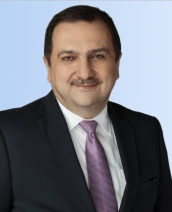Dr. Raymond Khoury
Partner
Head, Technology & Innovation Management Practice, Middle East
Raymond has over 29 years of experience advising senior government officials, private sector executives, and decision-makers on advancing their technology-driven modernization agendas with proper governance measures for tangible results.

Areas of Focus
Education
Past Experience

Raymond is a Partner based in our Beirut office. He is a member of the Middle East Partner Group and leads the Technology & Innovation Management (TIM) practice in the region. His primary industry market focus is on technology-enabled transformations and innovation agendas in both the public and private sectors.
Raymond is an expert in the functional areas of:
- Digital & innovation strategies
- Large-scale transformations (mainly e-government and digital government programs)
- National development agendas (mainly national ICT and digital programs)
- Public sector modernization and capability development
- Program implementation management
Prior to joining Arthur D Little, Raymond served as an executive vice president at Booz Allen Hamilton, where he co-led the re-establishment of the MENA business, led the regional digital practice across industries, and drove the firm’s regional office-footprint expansion. Before Booz Allen, he was a partner at Booz & Company, where he led the regional digital government business.
Raymond also worked with the World Bank Group (WBG) and the United Nations Development Programme (UNDP) as a senior technology advisor for a number of countries in the Middle East and Africa.
Raymond holds a Ph.D., Engineer’s Degree, and MS from MIT, as well as a BS in civil engineering from Northeastern University. He is an author of numerous reports, a frequent speaker at regional and international conferences and forums, and often interviewed by regional media on topics related to digital government, e-commerce, innovation, and leading ICT/digital trends.
Raymond is married to Maha and they have three children – Rami, Celine, and Joe. When free, he enjoys reading about new education trends and programs and keeps current with US sports – mainly baseball and football.


Charting the course

Technology foresight: anticipating future impact

Raymond is a Partner based in our Beirut office. He is a member of the Middle East Partner Group and leads the Technology & Innovation Management (TIM) practice in the region. His primary industry market focus is on technology-enabled transformations and innovation agendas in both the public and private sectors.
Raymond is an expert in the functional areas of:
- Digital & innovation strategies
- Large-scale transformations (mainly e-government and digital government programs)
- National development agendas (mainly national ICT and digital programs)
- Public sector modernization and capability development
- Program implementation management
Prior to joining Arthur D Little, Raymond served as an executive vice president at Booz Allen Hamilton, where he co-led the re-establishment of the MENA business, led the regional digital practice across industries, and drove the firm’s regional office-footprint expansion. Before Booz Allen, he was a partner at Booz & Company, where he led the regional digital government business.
Raymond also worked with the World Bank Group (WBG) and the United Nations Development Programme (UNDP) as a senior technology advisor for a number of countries in the Middle East and Africa.
Raymond holds a Ph.D., Engineer’s Degree, and MS from MIT, as well as a BS in civil engineering from Northeastern University. He is an author of numerous reports, a frequent speaker at regional and international conferences and forums, and often interviewed by regional media on topics related to digital government, e-commerce, innovation, and leading ICT/digital trends.
Raymond is married to Maha and they have three children – Rami, Celine, and Joe. When free, he enjoys reading about new education trends and programs and keeps current with US sports – mainly baseball and football.


Charting the course

Technology foresight: anticipating future impact
More About Raymond
- Massachusetts Institute of Technology (MIT)PhD (thesis in applied AI), Engineer’s and Master’s degrees in engineering
- Northeastern University (NU)Bachelor of Science, Civil Engineering (with high honors)
- Booz Allen Hamilton and Booz & CompanyPartner, ME Digital Practice Lead
- World Bank Group and UNDPSenior Technology Advisor, ME